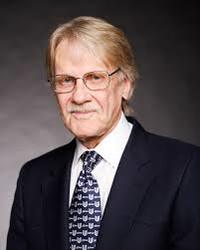Vernon L. Smith
More books by Vernon L. Smith…
“As Einstein once said, “It is the theory which decides what can be observed.” But I must add that prior to theory there is what we call “thinking”—a systematic form of consciousness deeply driven by the unconscious that enables understanding and experimental predictions The parallel is expressed in John 1:1, “In the beginning was the Word, and the Word was with God, and the Word was God” (KJV). For humans, all beginnings are in thought or reason. And in the reductionist search for reality, science can only identify mind, first in thing shopped for, then in the assurance of unseen evidence.”
― The Evidence of Things Not Seen: Reflections on Faith, Science, and Economics
― The Evidence of Things Not Seen: Reflections on Faith, Science, and Economics
“Smith strongly emphasizes that it is a fallacy to believe that our original moral perceptions of conduct are based on reason, even in those cases where general rules grow directly out of our experience and become an emergent order. These perceptions and the experience on which rules are founded are a consequence of our minds but not of reasoned thoughts:”
― Humanomics: Moral Sentiments and the Wealth of Nations for the Twenty-First Century
― Humanomics: Moral Sentiments and the Wealth of Nations for the Twenty-First Century
“Gregg: What is self-interest, properly understood?
Smith: Well, it means that the individual peers more to less. In terms of traditional kind of utility theory, it means that the subjective value, say, of something like money is monotone increasing. You are worse off if you get less of it, better off if you get more of it. Now, Adam Smith in Theory of Moral Sentiments says that we are all self-loving. [...] His point is that although we are all self-loving, in the process of maturation, of growing up in a social world, we are led to modify our decisions to take into account others, so that, as he says, we humble that self-interest and bring it down to what other people will go along with. So there is never a denial of the self-interest. If in an experiment in which I can take an action in which you are better off—you get more money and I get less—how do we now that more is better for someone else and less is worse? It’s because we have common knowledge of that. So in other words, being self-interested is necessary in order to know that when you take an action it can be hurtful to someone else. If you didn’t have that, then you wouldn’t know whether a particular action was hurtful or beneficial.”
― The Evidence of Things Not Seen: Reflections on Faith, Science, and Economics
Smith: Well, it means that the individual peers more to less. In terms of traditional kind of utility theory, it means that the subjective value, say, of something like money is monotone increasing. You are worse off if you get less of it, better off if you get more of it. Now, Adam Smith in Theory of Moral Sentiments says that we are all self-loving. [...] His point is that although we are all self-loving, in the process of maturation, of growing up in a social world, we are led to modify our decisions to take into account others, so that, as he says, we humble that self-interest and bring it down to what other people will go along with. So there is never a denial of the self-interest. If in an experiment in which I can take an action in which you are better off—you get more money and I get less—how do we now that more is better for someone else and less is worse? It’s because we have common knowledge of that. So in other words, being self-interested is necessary in order to know that when you take an action it can be hurtful to someone else. If you didn’t have that, then you wouldn’t know whether a particular action was hurtful or beneficial.”
― The Evidence of Things Not Seen: Reflections on Faith, Science, and Economics
Is this you? Let us know. If not, help out and invite Vernon to Goodreads.






























